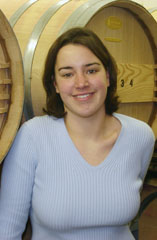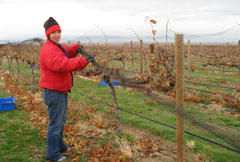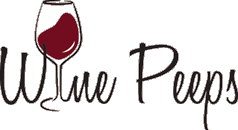Women of Washington Wine: Kerry Shiels of Côte Bonneville Winery
By Kori ~ July 25th, 2011.
Today’s post is part of a series featuring the Women of Washington Wine. In an industry once dominated by men, more and more women are joining the ranks as winery owners, vineyard owners, and winemakers. Being a woman myself, I am fascinated by these women and what they have done and continue to do. Through this series, I hope to introduce you to some of the brightest female faces in the Washington wine industry.
 Kerry Shiels is the Director of Winemaking for Côte Bonneville Winery, located in Sunnyside, Washington, in the Yakima Valley. Founded in 2001 by Kerry’s parents, Hugh and Kathy Shiels, Côte Bonneville is the estate winery for DuBrul Vineyard. The Shiels planted their 45-acre world-class vineyard in 1992. They quickly realized that DuBrul was a special vineyard and decided to start Côte Bonneville to showcase what the vineyard does best. Kerry has been officially involved with the family vineyard and winery since 2005. She graduated with a Masters in Viticulture and Enology from UC Davis in August 2009 and has also gained valuable experience working vintages in Napa, Australia, and Argentina.
Kerry Shiels is the Director of Winemaking for Côte Bonneville Winery, located in Sunnyside, Washington, in the Yakima Valley. Founded in 2001 by Kerry’s parents, Hugh and Kathy Shiels, Côte Bonneville is the estate winery for DuBrul Vineyard. The Shiels planted their 45-acre world-class vineyard in 1992. They quickly realized that DuBrul was a special vineyard and decided to start Côte Bonneville to showcase what the vineyard does best. Kerry has been officially involved with the family vineyard and winery since 2005. She graduated with a Masters in Viticulture and Enology from UC Davis in August 2009 and has also gained valuable experience working vintages in Napa, Australia, and Argentina.
Recently, Kerry was kind enough to take time out of her busy schedule to answer some questions for me and our Wine Peeps readers.
Highlights from Q&A with Kerry Shiels:
How did you first get involved in the wine business?
I grew up in the Yakima Valley around grapes and wine. My family planted the DuBrul Vineyard when I was in middle school. I made my first wine at 13. In high school, I was in tasting groups with winemakers. When Côte Bonneville was started, I was always involved. It was a natural fit when I was looking for something after my engineering career.
What were the steps that led to where you are now?
After college, I was hired as an engineer by Fiat to work in Italy, which was awesome! After two years in Torino, I was transferred to another part of the company back in Chicago. After a while, I decided that my life resembled Office Space and Dilbert a little too much. I got into engineering because I liked making things – and wine is definitely more fun to make than cars! I went to work in Napa, then Australia, and then back to work in Napa while I studied at UC Davis. I graduated with my Masters in Viticulture and Enology, and also received a travel grant, which took me to Argentina.
At what point did you decide that you wanted to join the family business?
Ever since I retired from engineering, I had been coming home to work with and learn from our winemaking team. When I finished my Masters, and especially when I came back from Argentina, it was time for me to be a full-time part of DuBrul Vineyard and Côte Bonneville. It’s an amazing opportunity to grow grapes at this level and work in a winery totally focused on quality. I feel prepared to make the wines but am also happy to be learning more about the nuances of the vineyard.
Has being a woman been an advantage or a disadvantage in your wine journey?
When I worked in the factory in Italy, it was definitely a challenge! In the wine industry, it is not really an issue. But I have always had strong competent women around me, like Kay Simon and Sara Spayd. They paved the way for my generation, both as women in the wine industry, and as professionals in the development of the Washington wine industry.
What advice do you have for a woman wanting to get involved in the wine business today?
My advice to anyone is the same. Work a harvest. Get lots of varied experiences. Get a degree. Find good mentors.
 What are your thoughts about the Washington wine industry, in general?
What are your thoughts about the Washington wine industry, in general?
Washington is a great place to be! We have world-class fruit, a dynamic growing industry, people who are cooperative and collaborative, and there are amazing opportunities here.
In recent years the Washington wine industry has grown at a rapid rate. Do you expect that trend to continue?
It’s still growing in terms of numbers of bonded wineries, but most of them are small. The last numbers I heard, Côte Bonneville is larger than half the wineries in the state, and we only make 2,000 cases. I think the next big growth phase we need is larger wineries to broaden the spectrum of wines available outside of the state. It’s tough to be known as a world-class wine region in Chicago or New York when they can’t find more than a handful of labels on the shelves. It takes time for wineries to grow large enough to distribute, as both production and the business aspects change, but it’s happening.
I understand that you spent time working at wineries in Napa, Australia, and Argentina. What did you learn from those experiences?
Heaps! In Napa, especially, I have been in a lot of vineyards up and down the valley and worked with a lot of winemakers. This taught me how people make decisions differently and what affects these decisions have on the wines. In Australia, I worked in a winery that was founded in the 1860s and has a very old-world mentality. Mendoza was interesting because the geology is similar to the Yakima Valley, but the socioeconomic climate, culture, and goals are all very different. The final wine is a combination of the site, the vintage, viticultural practices, and winemaking decisions. You have to understand the role each of these play and how they fit together in order to make a consistent style and quality of wine every year. It helps to have a breadth of experiences to draw from, in addition to the technical knowledge to keep things in context.
What is your vision for the future of Côte Bonneville?
First, to continue to make wines that people love. We will continue to showcase our vineyard, which is truly distinctive. Since I came home full-time, we have expanded into new products, such as Riesling and Cab Franc Rosé. We are making Syrah also, which I’m excited about.
Feel free to share any other thoughts that you believe would be of interest to our readers.
Eastern Washington is a really unique and special place. In DuBrul Vineyard, for example, we grow six varieties, all of which make world-class wines. Few regions in the world can grow so many varieties well, from Riesling to Cabernet. In Europe, you have to go to many regions in multiple countries to find the same level of diversity. Our northern latitude and desert climate combine to create an excellent wine growing area. We are lucky to have this agricultural bounty in our backyard.
—
Many thanks to Kerry for sharing her story and thoughts with us. I wish her and the Shiels family all the best and look forward to following their work and Côte Bonneville Winery with great interest, and I hope that you will too.
(Photos from Côte Bonneville Winery)
Filed under: American Wine, Interview, Washington State Wine, Women of Washington Wine

 Wine Peeps is an independent wine blog dedicated to helping you get the most bang for your buck in wine. We do this through blind tastings of wine from around the world and calculations of
Wine Peeps is an independent wine blog dedicated to helping you get the most bang for your buck in wine. We do this through blind tastings of wine from around the world and calculations of 










